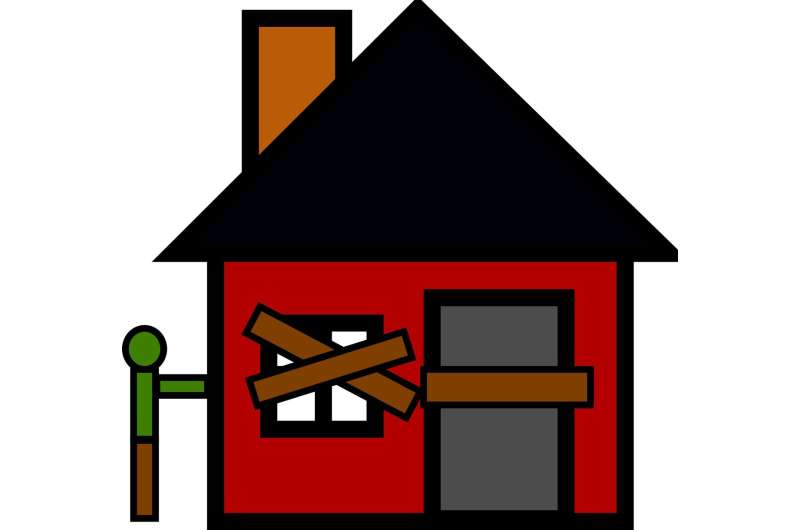Credit: Pixabay/CC0 Public Domain
Higher eviction rates in Philadelphia neighborhoods are linked to higher crime, homicide, and burglary rates, according to new Rutgers University–Camden research.
"We believe that the destabilizing effect that evictions have on households can happen throughout entire communities," says Dan Semenza, an assistant professor at Rutgers–Camden.
Semenza and research co-authors examine the relationship between eviction rates and crime, homicide, and burglary rates in all Philadelphia neighborhoods from 2006 to 2016 in their new paper, titled "Eviction and Crime: A Neighborhood Analysis in Philadelphia," published in the journal Crime & Delinquency.
The researchers took data on Philadelphia eviction rates from the Eviction Lab database created by Princeton researcher Matthew Desmond—author of the book Evicted: Poverty and Profit in the American City—and paired it with crime rates for each neighborhood provided by the Philadelphia Police Department and demographic data from the American Community Survey.
"You put all that data together and you start to get a better idea of the relationships between these different variables," says Semenza.
According to Semenza, the researchers already knew from prior studies that households experience significant "fallout" from eviction.
"When a household gets evicted, it hurts the health and financial well-being of the family and their ability to get back on their feet, and it often drives them into worse conditions than where they were living before," he says.
Although this destabilizing effect is known on an individual level, he explains, there hasn't been a lot of research on what happens when you consider eviction throughout an entire community. The researchers thus wanted to determine what happens if eviction rates in an entire neighborhood in Philadelphia are higher, and how it changes community crime outcomes.
"We anticipated that this destabilizing which is happening in households would happen to the entire community, and indeed that's what we believe is taking place," he says. "People are moving more often when eviction rates are higher. That creates a lot of problems when the community is destabilized; you start to see upticks in the crime rates."
The Rutgers–Camden researcher notes that the COVID-19 pandemic has illustrated "a precarious fine line" that most households live on financially, day-to-day and month-to-month.
"So that when something happens, like a pandemic or even something smaller, like an unexpected car repair, it can really totter a lot of households over the edge to where they become in danger for eviction because they cannot pay rent," he says.
He explains that one of the main problems that many families face is "getting through the red tape" to qualify for public housing assistance. He posits that general public assistance is more important than ever so that people don't have to apply for housing assistance programs with these rigid qualifications.
"We need to help those families that are on that edge and provide that assistance which is readily accessible, and not make it harder than it needs to be to get that help," he says.
He notes that the federal eviction moratorium, which was recently extended until October, has kept many people from being forced out of their homes, but it's hard to tell what the moratorium will look like in the coming months in Philadelphia. He says that the way the moratorium is written, it is only in effect in places where there is high community spread of COVID-19 and those numbers are changing daily.
Semenza adds that, without long-term data, it is difficult to say how the moratorium will affect crime rates in Philadelphia. He notes that violent crime has risen, particularly in Philadelphia, despite the fact that the moratorium has been in place. However, he says, the pandemic has upended so many other factors that contribute to crime, so it's really an impossible comparison to make.
When the ban on evictions is lifted, he continues, their research suggests that there is cause for concern.
"COVID-19 has altered people's lives and many households are in a more precarious financial position," he says. "Reintroducing evictions into communities come the fall may further destabilize communities and potentially influence crime rates over time. With violent crime spiking in many cities, including Philadelphia, more evictions may cause further disruption on top of the already harmful effects of the pandemic."
In terms of a safety net, says the Rutgers–Camden researcher, a more permanent solution is needed, which means coming to grips with a lack of appropriate, affordable housing in many places in the country.
"The infrastructure for public housing is old and inadequate, and that has to change," he says. "Change to housing availability needs to be part of a big federal push and not just local drips and drabs here and there."
More information: Daniel C. Semenza et al, Eviction and Crime: A Neighborhood Analysis in Philadelphia, Crime & Delinquency (2021). DOI: 10.1177/00111287211035989
Provided by Rutgers University























